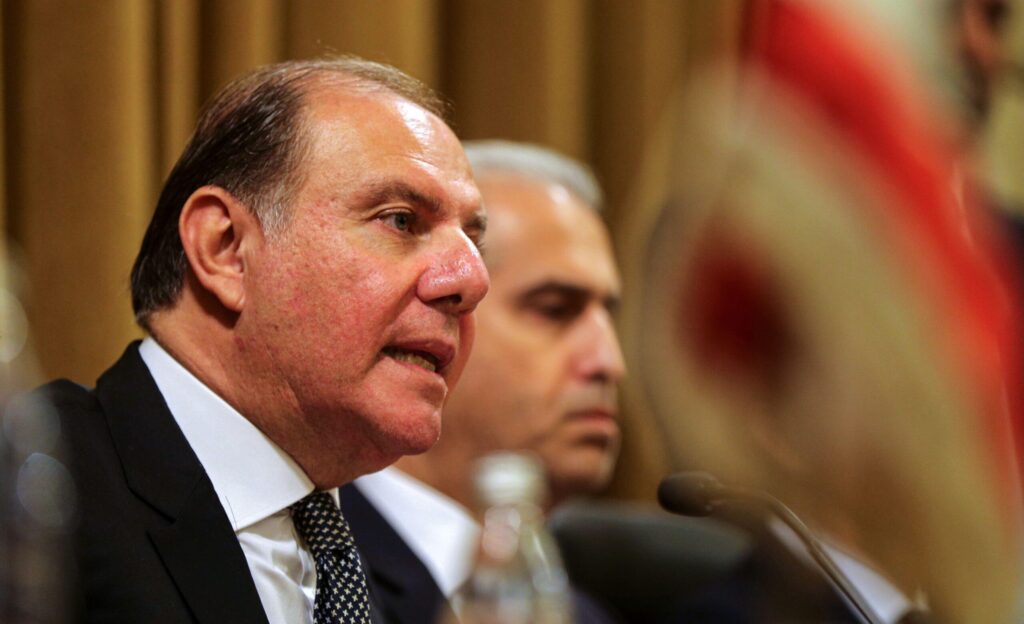I wish Karim Souaid, the new governor of the Central Bank of Lebanon, good luck in solving the country’s banking crisis. However, I am not holding my breath for a quick fix.
Souaid was appointed on March 27, replacing Wassim Mansouri who, as first deputy governor, had been acting governor since July last year, when Riad Salameh’s term of office expired.
As a Shia Muslim, Mansouri is ineligible for the top job: the governor of the central bank is always a Maronite Christian. The four deputy governorships are allocated, one each, to the Shia, Sunni, Druze and Armenian communities.
Some press reports have questioned Souaid’s qualifications for the governorship, noting that he has no central banking experience. His early career was in commercial banking (with Saudi American Bank and then with HSBC in Dubai). More recently, he worked in asset management and private equity at a GCC-focused firm with strong Lebanese roots.
I don’t think his lack of central banking experience matters. Years ago, while working in Cairo, I saw how the Central Bank of Egypt (CBE) recruited commercial bankers with experience of GCC banking and international finance. The CBE was transformed, and its new leaders went on to implement a successful bank reform programme that greatly strengthened the Egyptian financial system.
More importantly, Souaid’s lack of central banking experience does not matter because it is politics, not financial issues, that are preventing the resolution of the Lebanese banking crisis.
Bank restructuring is complex, but the mathematics, and even the accounting treatment, is not hard: employ an independent consulting firm, with no skin in the game, to estimate how much of banks’ assets are likely to be repaid. Then write off all shareholders’ equity, all or nearly all obligations to overseas bondholders, and then – and this is the difficult bit – work out how much of depositors’ funds need to be written off so that assets and liabilities balance.
The central bank has issued billions of dollars in debt at high interest rates, which it has no possibility of honouring
In Lebanon, there are three sets of stakeholders whose interests need to be addressed. The shareholders of the banks, rich individuals with large deposits in banks, and the vast majority of customers whose deposits are small but who are economically vulnerable.
The message to shareholders is that writing off their equity in the bank is not enough. If they want to retain their banking licences, they need to put in new money so that their banks are viable for the future, after the losses of the past have been resolved.
In Lebanon, the leading banks are controlled by powerful families. They have political influence, and they want to continue to control a bank: diluting their financial obligations by merging with others is going to be hard to accept.
Rich depositors can absorb haircuts – say, having $10 million reduced to $5 million – especially if much of their wealth is offshore or in real assets. But they account for just 10 to 15 percent of deposits, so even drastic haircuts won’t close the gap.
That leaves the mass of Lebanese depositors who have already seen their savings destroyed by currency devaluation, inflation, or both.
Governor Souaid’s statements since taking office imply that he thinks all deposits can be reimbursed over time, if the Lebanese government and the central bank step up and take responsibility for the scale of the banks’ problems.
That seems optimistic.
The Lebanese government is in no position to subsidise a restructuring by injecting new money into the banking system, and the central bank itself is at the root of the problem. It has issued billions of dollars in debt at high interest rates, which it has no possibility of honouring.
International bodies like the World Bank and governments like France have funds but won’t invest in individual institutions. Their priorities also include transparency, governance and fighting financial crime. That’s why governor Souaid’s announcement on the central bank’s forensic audit and the Council of Ministers’ move to ease banking secrecy is significant.
All of this is taking place in a domestic political environment that is riven by division and insecurity. Israel’s wars against Hamas in Gaza, and Hizbollah in Lebanon, are far from over; conditions in Syria are unstable; and it is reasonable to expect some pyrotechnics in US-Iran relations in the months ahead.
Amid such profound challenges, perhaps all we can expect from governor Souaid is that he starts to rebuild trust in the Lebanese central bank and in Lebanon’s financial institutions.
If he can indeed start to isolate the central bank from political pressures, show technical competence (continuing the work of deputy governor Mansouri) and, through forensic audit, lift the lid on what happened during the closing years of Riad Salameh’s tenure, that will be a huge achievement.
If he can quickly remove Lebanon from the Financial Action Task Force’s “grey list”, where it was placed last October, that will be a bonus.
Andrew Cunningham writes and consults on risk and governance in Middle East and sharia-compliant banking systems
Register now: It’s easy and free
AGBI registered members can access even more of our unique analysis and perspective on business and economics in the Middle East.
Why sign uP
Exclusive weekly email from our editor-in-chief
Personalised weekly emails for your preferred industry sectors
Read and download our insight packed white papers
Access to our mobile app
Prioritised access to live events
Already registered? Sign in
I’ll register later



